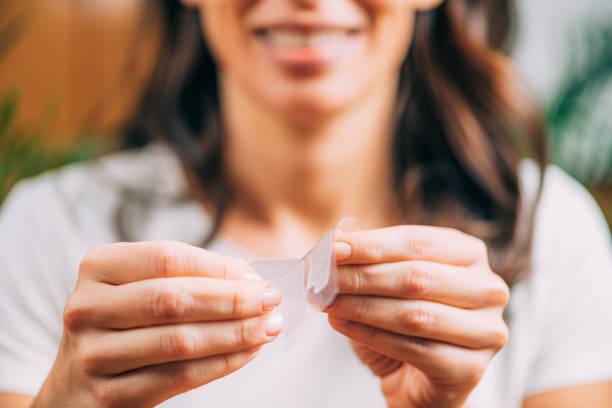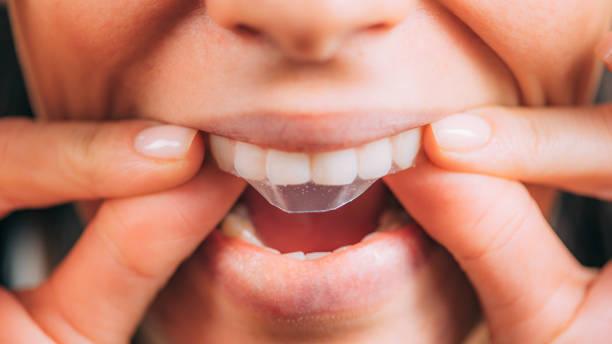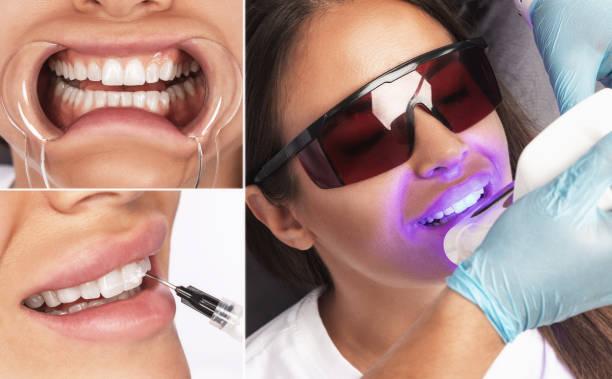
In today's quest for a brighter smile, teeth whitening strips have become a popular go-to option for many, which promise an easy and effective way to whiten teeth at home. Yet, the real question is—do these products actually live up to their claims of whitening power?
Patients frequently ask Charlotte Emergency Dental about the impact of whitening strips, and this guide is designed to offer straightforward answers. Let’s explore the truth about how whitening strips work to help you decide if they are a good fit for your smile.
Teeth whitening strips are designed to brighten your smile by using a whitening gel that targets surface stains. This gel, typically containing hydrogen peroxide or carbamide peroxide, is key to their performance. When applied, the gel releases oxygen molecules that penetrate the enamel, breaking down and lifting away stains.
The primary components of most whitening strips are hydrogen peroxide and carbamide peroxide. Hydrogen peroxide functions directly as a bleaching agent, while carbamide peroxide decomposes into hydrogen peroxide upon contact with water, both working to dissolve stains.
To use teeth whitening strips, you generally place them on your teeth for a specified period—usually 20 to 60 minutes. The strips adhere to your teeth, allowing the gel to work its magic. After the recommended time, you remove the strips and rinse your mouth to eliminate any remaining gel.
Teeth whitening strips are generally safe when used as directed. However, it’s important to follow the instructions provided by the manufacturer to avoid potential side effects like tooth sensitivity or gum irritation.
The short answer is yes—they do work, but their success can vary based on individual circumstances and usage. Some people may see noticeable results in just a few days, while others might need to use the strips consistently for weeks before seeing a significant difference.
Considering these aspects will not only refine the results you get from your whitening strips but also help preserve the whiteness of your teeth over time.
Different types of stains respond differently to whitening treatments, and whitening strips may be more effective for some stains than others. Following are the primary categories of stains and how whitening strips address each:
These are surface stains caused by foods, drinks, and tobacco use. They are usually well managed by whitening strips, which focus on removing the discoloration from the tooth’s exterior to improve their appearance.
Intrinsic stains are deeper and can be caused by aging, certain medications, or excessive fluoride exposure. Whitening strips may have limited effectiveness on these types of stains, as they primarily address surface-level discoloration.
If you have dental work like crowns or veneers, whitening strips won’t change their color. In fact, using whitening strips on dental work can create an uneven appearance if your natural teeth become lighter while the dental work remains the same.

With so many teeth whitening solutions available today, it can be overwhelming to determine which method will truly brighten your smile. Let's break down the various treatments and their respective pros and cons to see how they measure up against each other.
Professional whitening performed at a dental office offers a highly effective way to achieve a bright smile. This method involves the use of powerful whitening agents and advanced technology.
Custom-fitted whitening trays are another popular option, offering a more personalized whitening experience compared to over-the-counter products.
These products are designed to help maintain a brighter smile and are part of a daily oral care routine.
Whitening pens offer a targeted approach for quick touch-ups, ideal for addressing specific areas of discoloration.
In essence, teeth whitening strips present a balanced choice. They offer better results than whitening toothpaste but are not as potent as professional treatments or custom trays. For those seeking an effective, cost-efficient solution with moderate results, whitening strips may be the perfect fit.
While whitening strips can be effective, they might not be the best option for everyone. Here are some scenarios where professional whitening could be more beneficial:
If your teeth have deep stains or discoloration that hasn’t responded to over-the-counter products, professional whitening might be necessary. Dentists use more potent formulas and advanced techniques to tackle persistent stains that regular strips may not fully address.
If the strips are leaving your teeth unevenly whitened, a dentist can offer more precise treatments to achieve an even smile. Professional treatments ensure consistent results, addressing any patchy or uneven areas effectively.
If you experience significant tooth sensitivity with whitening strips, a dentist can recommend alternative methods that are gentler on your teeth. Professional treatments can be tailored to minimize discomfort and suit your dental health needs.
Professional whitening can provide faster and more noticeable results, making it ideal if you need a brighter smile quickly. In-office treatments deliver dramatic improvements in less time compared to at-home products.
Ultimately, consulting with a dentist can help determine the best whitening approach for your individual needs.

Choose Charlotte Emergency Dental for unparalleled dental care! From preventive measures to restorative treatments, our experienced team provides exceptional dental services throughout the Charlotte area.
Discover every service we have to offer and see how we can support your dental journey with our wide array of solutions. Whether you are dealing with a dental emergency or just need a routine check-up, we are ready to deliver the highest quality care.
So, don’t settle for less than the best—contact us today and let your smile get the attention it deserves!
To wrap things up, teeth whitening strips can indeed be a useful tool for brightening your smile, provided they are used correctly and consistently. They offer a cost-effective alternative to professional whitening treatments, with varying degrees of effectiveness depending on the type of stains and individual sensitivity.
Remember, the key to successful teeth whitening is to use the strips as directed, maintain good oral hygiene, and consult Charlotte Emergency Dental if you have any concerns. By doing so, you can achieve a brighter smile without compromising your dental health.

We have temporarily updated our hours, reflected below.
MONDAY to FRIDAY
9:00am – 7:00pm
SATURDAY to SUNDAY
9:00am – 3:00pm
Save time, print online! Fill out forms online before your first visit to shorten your appointment time with us.